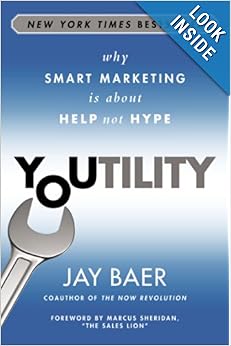 I think that many of the people out there providing social media advice are providing the wrong advice. It is not necessarily their fault – because in essence they are simply providing the answers to the wrong questions. These questions tend to be a version of “how can we use social media to reach our consumers?” to which the right answer is “you can’t, you have to understand social media as something your consumers can use to reach you, if and when they want to”. The problem is, the organisations asking these questions don’t necessarily want to pay money to receive this answer, hence the lack of people giving it.
I think that many of the people out there providing social media advice are providing the wrong advice. It is not necessarily their fault – because in essence they are simply providing the answers to the wrong questions. These questions tend to be a version of “how can we use social media to reach our consumers?” to which the right answer is “you can’t, you have to understand social media as something your consumers can use to reach you, if and when they want to”. The problem is, the organisations asking these questions don’t necessarily want to pay money to receive this answer, hence the lack of people giving it.
It is therefore great to find other people out there who are providing the right answers and also trying to get organisations to re-frame the question. One such person is Jay Baer. I had been vaguely aware of Jay as being “a name” on the social media scene in the US, but had never really checked-out his stuff. But then, last week, I came across a piece he wrote that was published in Social Media Today. It was about a brand ‘blowing it’ on Twitter and I hoped I could scoop it up as a case study to put into my training courses – but as I was scanning it, one idea seized my attention. This was the idea of “listening at the point of need”. I felt this idea perfectly captures what I try and teach organisations about social media being understood as a behaviour identification and response challenge, rather than a channel and message challenge.
This in turn lead me to check out his latest book: Youtility – why smart marketing is about help not hype. I am not overly keen on the name Youtility. I can see why this seemed like a smart twist on utility, but I am not sure who the You actually is, or if even if utility as a concept is the right concept to be riffing with. Themtility might have been more accurate, but clearly less snappy. However, I think the ideas he puts forward are spot on and give another perspective on all the key themes I bang-on about (behaviours and response, listening, information rather than content etc).
Here are a few soundbites drawn from his summary of the book on Slideshare.
If you are asking about how to get more attention and how to make your products seem more exciting online, you are asking the wrong question.
See my point at the start of this post. Continue reading →
 eMarketeers have asked me to run a free webinar on social media measurement next month. As you can see from the blurb, this is not a review of all the sundry measurement tools and techniques that are out there at the moment – in fact it will largely be a riposte to our belief in the effectiveness of these things. Rather I will be suggesting that we first need to work out what it is we should be measuring in order to then work out what tools we should be using to measure it.
eMarketeers have asked me to run a free webinar on social media measurement next month. As you can see from the blurb, this is not a review of all the sundry measurement tools and techniques that are out there at the moment – in fact it will largely be a riposte to our belief in the effectiveness of these things. Rather I will be suggesting that we first need to work out what it is we should be measuring in order to then work out what tools we should be using to measure it.



 A couple of weeks back I got the opportunity to attend the awards ceremony for the EACA Euro Effies. These are essentially advertising awards (or more precisely awards for advertising agencies) that are not judged by creatives for their creativity, but judged according to how effective they are in meeting the clients’ business objectives. (Should there actually be any other types of awards I ask?). The interesting thing was how little actual advertising featured in many of the winning entries. It reminded me of the sage words of Lou Capozzi , former boss of the MS&L PR network, who – on looking at the changing marcoms landscape – declared “it is all just become PR with zeros added to the budget.”
A couple of weeks back I got the opportunity to attend the awards ceremony for the EACA Euro Effies. These are essentially advertising awards (or more precisely awards for advertising agencies) that are not judged by creatives for their creativity, but judged according to how effective they are in meeting the clients’ business objectives. (Should there actually be any other types of awards I ask?). The interesting thing was how little actual advertising featured in many of the winning entries. It reminded me of the sage words of Lou Capozzi , former boss of the MS&L PR network, who – on looking at the changing marcoms landscape – declared “it is all just become PR with zeros added to the budget.”


 I am an anti-social-media expert
I am an anti-social-media expert